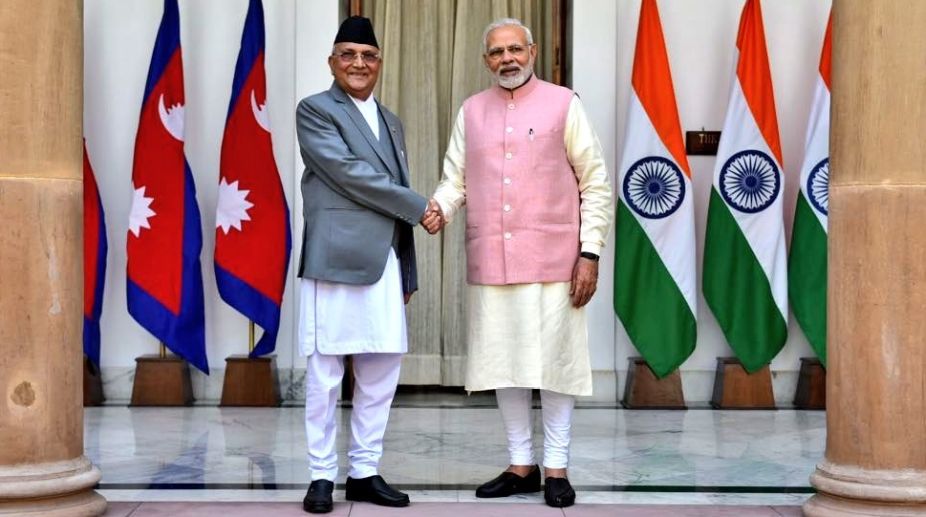A vote for BJP will ensure Tripura’s prosperity: PM to Agartala electorate
Modi claimed that the North East policy of the Congress and the Communists was a Loot East policy, which the BJP buried 10 years back and initiated an Act East Policy.

(Photo: Twitter/MEA)
Nepalese PM Oli’s visit to India has given an important lift to bilateral relations and done much to restore ties that have been under unwonted strain in the last few months. India and Nepal have traditionally enjoyed an extraordinary closeness, marked by harmonious exchanges and steadfast cooperation, and while this remains the norm there have been a few awkward passages in recent times that have led to some problems between them.
Mr Oli’s visit, intended to repair ties, had the intended impact and should do much to eliminate the complaining and cavilling that has crept into the relationship. The visiting PM was able to draw on the deep relationship his country has always enjoyed with India and to effectively reaffirm the historic goodwill between them: his image as a tough nationalist identified with a stronger Nepalese foreign policy did not stand in the in the way or affect the goodwill he conveyed.
The Oli visit reflected a long-established bilateral relationship that has few parallels anywhere. Consider, for instance, the maintenance of an open border between the two countries, which is hardly to be seen anywhere else, while the two countries decided as long ago as 1950 to create a shared space between them through agreeing that their common border should be open and be regarded as a shared feature. By now, the two sides take this more or less for granted, though it is a unique and highly beneficial feature, and if it has lasted as long as it has that is because it benefits both sides and impels them to maintain it and keep it in being. This is not to suggest that an open border is a panacea, for neither side is always comfortable with some of its aspects: at different times, each party has been critical and found defects in this feature, even on occasion questioned its continued relevance in current circumstances. But wiser counsel has invariably prevailed, and there has been no interruption of the largely unregulated cross-border activity from which both countries benefit.
Advertisement
Friendship between the two countries is reinforced by the strong cultural and religious ties they share. Mr Oli was eloquent on the theme of friendship, which he rightly elevated to the first place in India-Nepal matters and the way onward to a better and more stable relationship. After a testing time, it seems that the two countries are once again strengthening their mutual cooperation and finding new ways of promoting their shared interests.
At the same time, the Nepalese leader’s visit has thrown up new challenges within the region as a whole, which was only to be expected in view of the accelerating pace of progress in South Asia. A number of ambitious projects have now been framed and are beginning to take shape, with the effect of opening new lines of access and communication in areas that were formerly poorly developed. India was always the most readily available access route for Nepal and this remains as it was, though now new development possibilities have arisen, with some fresh routes of access now under development. With the expansion of its development efforts at home and abroad, Nepal has also been in quest of alternative development possibilities in its own region, including access to its traditional routes. Nepal has long chafed at its land-locked status, situated as it is between India and China, and it has looked for some form of equidistance between these two neighbours and this issue has on occasion had contentious consequences not during Mr Oli’s visit where it was constructively handled by both sides.
There are other issues that can be similarly complex in some situations, among them the matter of pioneering new access to trading possibilities across the high mountains, where issues with strategic overtones need to be addressed. India often feels vulnerable to a third party presence in the Himalayan region, and this requires thoughtful dealing between all the parties involved, to keep at bay such misunderstandings as may arise.
India and Nepal have now promoted major economic development projects that could have a striking effect on their respective advancement and prosperity. As is constantly reiterated in the literature on the subject, Nepal is one of the greatest international reservoirs of hydro energy. So far as India is concerned, apart from its importance as a source of hydro-power, the Himalayan tract is the immemorial wellspring of civilization, and there are indissoluble links that bind it to Nepal, not to be measured in material terms alone. Nepal is no less affected and equally engaged in the task of the rapid advancement of its society. Mr Oli’s visit to India should provide an important impetus for the two countries to strengthen their joint efforts to progress and advance.
The writer is India‘s former Foreign Secretary
Advertisement